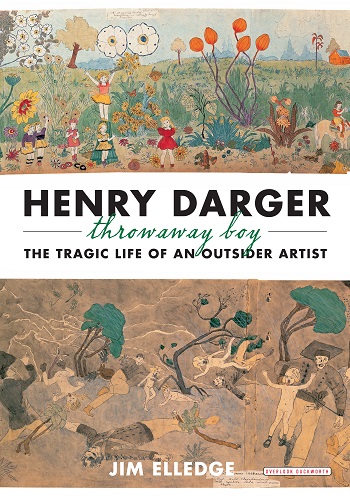 |
I’m going to admit that I’d never heard of Henry Darger before I read Henry Darger, Throw Away Boy.
Henry Darger (1904-1973) was an Chicago-based artist, who was completely unknown in his lifetime. He created pieces of art that depicted children. In some of the art children were innocently enjoying life and in others they were being horrifically tortured. Darger also completed two fantasy manuscripts entitled The Realms and Crazy House. Many critics dubbed Darger as a mentally unstable individual who may have thought about harming children. But as Jim Elledge uncovers in Henry Darger, Throw Away Boy that couldn’t be farther from the truth. Elledge has spent a decade researching and writing this book which gives a comprehensive insight to the life of Darger. It is well researched, which is indicated by the extensive bibliography and notes sections. |
The book starts by describing the poverty, dangerous street life and Darger’s lack of supportive loving parents. Darger’s mother died in childbirth and his father was an alcoholic. It is suspected that Darger was sexually abused on a number of occasions throughout his childhood. This commonplace abuse, did make uncomfortable reading at times. His behaviour, even as a young child was feral which is understandable given the emotional trauma he experienced. His bad behaviour led to his father putting him in a religious mission and later an asylum institution.
Darger escaped the institution and became a Janitor in a hospital. He began to create his art and write his manuscripts, as a way to fictionalise his traumatic childhood experiences. In his manuscripts he wrote about a number of secret societies, all that have one mission: to protect children. He fell in love with a man (Whillie) and continued to work tirelessly on his art over the decades that followed. But after some early criticism, he didn’t feel able to share his work with the world. It wasn’t until after his death that his landlord discovered the work.
Essentially Elledge tells the story of a gay man filled with fear and shame because of societies attitudes towards children, child abuse and gay people. Glossy pages show some of Darger’s work, but more would have been welcome.
Elledge brings Darger’s story to life through his engaging writing style. If you’re into gay art – in all it’s forms, you’ll love Henry Darger, Throw Away Boy which is available to buy on Amazon.
Review soon,
Antony
Sign up to my monthly newsletter:

